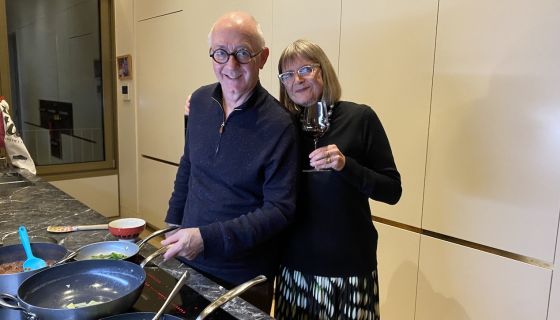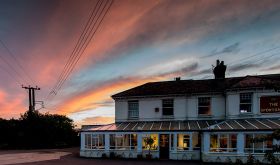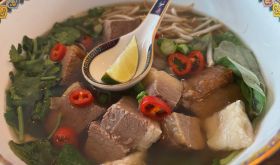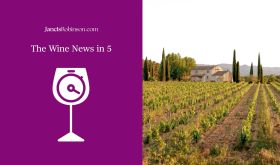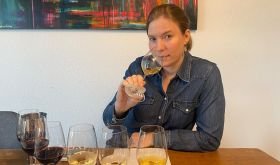After a combined almost 80 years of writing about wine and restaurants – Jancis began in 1975 while I started somewhat later, in 1989 – I believe that the time is right to tackle a subject that I trust is of interest to all our readers and is one that neither of us has ever tackled before: what are the main differences in our professions?
Unquestionably, we are very fortunate to be married to each other. An invitation to dinner for one of us can easily, and not too expensively, be extended to the other. Our worlds do overlap – wine tastes so much better with food and good wine does make the food taste even lovelier. As for crossover between our two subjects, the number of winery restaurants that have opened over the past couple of decades has certainly increased the enjoyment of wine tourists in Spain, Italy, California, Australia, New Zealand… Everywhere in fact has seen a dramatic improvement in the winery restaurant scene – with the arguable exception of France.
But although we both spend our working days, and in Jancis’s case early mornings and early evenings, writing about wine and food there are certain very profound differences in how we approach our subjects. Here are several that spring to my mind.
1. There is no question that wine is a far more academic subject than food. There is, for example, no equivalent of the WSET or even the MW exams in the food world. Everybody has an opinion of what makes a good restaurant, a good chef and thoughtful waiting staff but who will venture an opinion on the ageing potential of a flight of 2020 red burgundies?
This was brought home to me as recently as last Sunday night, the day after our annual Christmas dinner for the heavily reduced members of the JancisRobinson.com team who ventured to visit us in central London. Now admittedly, the wines were quite special but I did notice that all the bottles had been assiduously stoppered and tops put on all the decanters. This was all done to allow Jancis to taste these wines again 24 hours later, to write full tasting notes on them, and to clarify her opinions on them.
All I had, in return for several hours of work at the stove and a couple of hundred pounds spent on buying the raw ingredients, was the ability to enjoy some leftover Morecambe Bay potted shrimps and some delicious Stilton. My meal was finished. The leftovers from the bottles could still provide Jancis with plenty of information. And indeed she benefits from leftovers far more than I do.
2. Perhaps because those who write about restaurants live in the same country, and very often the same city, as those who own and work in the restaurants, there is somehow the feeling that a touch of favouritism will prevail between the restaurant reviewer and the restaurateur. For British wine writers, with the vast majority of their subjects having to be imported into the United Kingdom (pace all producers of English and Welsh wine), this has never been the case.
Even before the travel restrictions of the past 20 months, there was much less opportunity for wine writers to meet winemakers than for us restaurant critics to meet those we write about.
3. But an unexpected consequence of this is that the profession of wine writing seems to me to be far more sociable than my own. That is mainly to do with the fact that wine is for sharing.
Jancis will often be invited to a wine tasting along with numerous others, many of whom have become close friends over the years. They will share pours from the same bottle and, such is the disinhibiting nature of wine, share stories and the odd bit of gossip.
This is in complete contrast to how restaurant correspondents learn about a new restaurant. A PR person sends us an email with the names of the leading participants – the chef, the restaurateur, increasingly the person responsible for the bar’s offerings – its opening times and, if the sender is extremely efficient, an enticing menu. There is often the mention of a reduced price for the opening few days and assistance with making a reservation.
The biggest outcome of these differences is that writing about wine is far more sociable. Jancis meets and tastes with far more of her peers than I ever do. I know a few of my fellow restaurant writers by name but that is all.
4. This is also because wines can be grouped far more variously than restaurants. Wines can of course be rated individually but also by vintage, by group based on place of origin, such as right or left bank of Bordeaux, and by grape variety. Wines from different countries can therefore be compared very easily. I have only ever written one article in which I have compared two restaurants, my article on Maison Troisgros and Lameloise published last month. This was a tricky article to write and it was very expensive – but both were fun.
5. All of this goes some way to explaining the two biggest differences in our professions – where and how we get to enjoy the food and the wine we then write about.
There could not be a starker difference. Other than at tastings, all the wine that Jancis tastes comes to her front door nowadays, whereas any excursion to a restaurant involves just that – a trip out. This has long been the case to a certain extent, and the tasting-at-home routine has become even more marked during the pandemic, given that so many professional tastings have been abandoned. It applies to all wines other than those Jancis has chosen to buy and cellar.
I make a point of paying for every meal in every restaurant I visit, even when a friendly or generous chef or restaurateur emerges with the offer of a supplementary dish or a bottle of wine. And such expenses are not insignificant – £15,000–£20,000 during each of the last couple of years. And I try to be as scrupulous as I can be, fully aware that two reputations are at stake.
But I would not have it any other way. Neither as a professional nor as a husband.
Jancis adds I agree that the world of wine is wonderfully sociable. I wonder whether any restaurant critics base a review on a meal shared with another writing for another publication and risk being suggestible to another critic’s view? Nick’s right that when we wine writers get together, we’re much more likely to discuss the latest wine gossip than what we are tasting, so there is little likelihood of one wine writer influencing another’s opinion. (Though I do love the – true – story of one Southwold tasting before I joined the group but when Roy Richards, an acute taster, was part of it. One merchant, let’s call him X, was found to have peppered his tasting notes with ‘Roy thinks this is very good’.)
The contrast between our work was at its most stark when Nick was a restaurateur. I remember feeling so appreciative of the fact that my investment was just a stack of paper (and later a computer and floppy disks – remember them?). But Nick had to borrow massive sums to do up and open L’Escargot. Then he had dozens of staff to manage whereas I was locked in my own little world with occasional forays to keep editors sweet. And the range of things that can go wrong for a restaurateur is almost endless – staff stopped and searched, fire alarms to be attended to, a power outage in a cold-room full of food – whereas the worst thing that could happen to me was a slightly missed deadline.
Truly we wine writers are blessed, especially those of us married to a willing and talented chef. And I haven’t even mentioned the huge pleasure our subject gives us.

